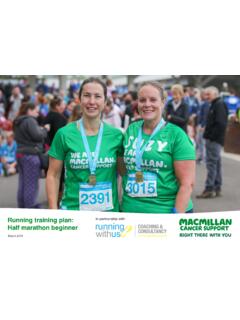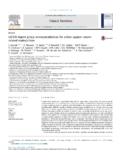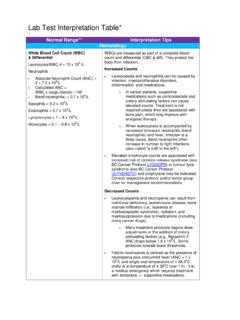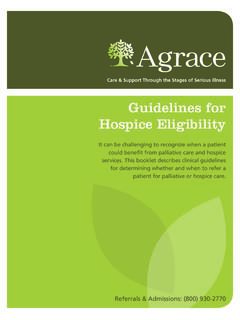Transcription of Quality in Nursing Excellence in Cancer Care: The ...
1 Ensuring Better TreatmentQuality in NursingExcellence in Cancer care : The Contribution of the ClinicalNurse SpecialistNational Cancer Action TeamPart of the National Cancer Programme 22 ContentsForeword3 The role of the Clinical Nurse Specialist in Cancer care4 The cost of managing cancer5 Reducing the financial burden of Cancer the potential of the CNS6 CNSs: leading Quality and productivity in Cancer care6 Experience from the front line CNSs transforming Cancer care7 Case Studies8 Delivering the future for Cancer patients11 Matching workforce planning to patient need11 Issues for Employers and Managers to consider12 Further sources of information13 Acknowledgments13 References14 Endorsements15 Key contributions that CNSs make to Cancer care533 Together we share an ambition to achievethe best Cancer outcomes for patients in theUK, recognising that, at a time of tightenedbudgets, it is critical that NHS resources aredeployed to best effect.
2 Now more thanever, clinical nurse specialists (CNSs) have avital role to play in delivering high qualityand compassionate care , including carecloser to home, and supporting a drive forefficiency that improves health outcomesand maximises CNSs have played an important rolein the successful implementation ofinitiatives to improve NHS Cancer an increasing incidence of thedisease and an ageing population, deathrates from many cancers are dropping,survival rates are improving and manypatients experiences of care have beenenhanced. CNSs are at the front line ofcancer care ; they are the main point ofcontact for patients and as a result help toshape services for each patient according toneed and patient choice, which contributesto wider Cancer priorities. For example,CNSs play an important role in enablingcare to be delivered closer to home and inimproving patients and their families ability to self-manage symptoms and side-effects of contribute to increasing the Quality ofcare provided by the NHS; indeed, in theface of rising patient expectations, morepatients report being treated with dignityand respect and having trust andconfidence in their care team.
3 Increasingly,they have an ongoing role in supportingcancer survivors as well as Cancer it is estimated that there are now 2million people living with Cancer and this isset to rise to 4 million by For people affected by Cancer , the effectivemanagement of their care pathway isessential to maintainquality of life. Peoplewhose care isunplanned and un-coordinated are morelikely to be high usersof health and socialcare services,including emergencycare. CNSs work closely with patients andwith their clinical colleagues to adapt topatients emerging needs thus reducing theneed for unplanned care . This short guide is designed to supportclinical teams, commissioners, employersand managers to understand and evaluatethe contribution of CNSs in Cancer as theyplan their local workforce and serviceimprovement strategies. With examplesdrawn from front-line services across arange of cancers, this guide sets out howeffective CNS deployment drives innovation,reduces inefficiency and improves thequality of Cancer care across the UK.
4 We still have further to go if we are toimprove outcomes for all cancers, with theaim of bringing us in line with the best inEurope. Ensuring provision of CNSs wherethey are needed, coupled with effective useof their skills and expertise will enable us tomove faster towards this goal. Professor Sir Mike RichardsNational Cancer DirectorCiar n Devane Chief ExecutiveMacmillan Cancer SupportDame Christine Beasley DBEC hief Nursing Officer (England)Department of HealthForeword24 The roles undertaken by Clinical NurseSpecialists (CNSs) are many and varied;however, there are core clinical practicefunctions and a level of practice that couldbe reasonably expected of all CNSs in cancercare. CNSs in Cancer care can be described asregistered nurses, who have graduate levelnursing preparation and who would usuallybe expected to be prepared at Master slevel. They are clinical experts in evidence-based Nursing practice within a specialtyarea.
5 The specialty may be focused on apopulation ( young people), type ofcare ( palliative care ), type of problem( lymphoedema), type of treatment ( ) or tumour type ( lungcancer).CNSs treat and manage the health concernsof patients and work to promote healthand wellbeing in the patients they care in Cancer care practice autonomouslyand integrate knowledge of Cancer andmedical treatments into assessment,diagnosis, and treatment of patients'problems and manyspecialist nurses may function at anadvanced level, this level of practice is notcommon to all, thus the title Clinical NurseSpecialist does not in itself indicate that thenurse is an advanced practitioner .The high-level activities of CNSs can beseparated into four main thecontext of Cancer care these consist of:1 Using and applying technical knowledgeof Cancer and treatment to oversee andcoordinate services, personalise thecancer pathway for individual patientsand to meet the complex informationand support needs of patients and theirfamilies2 Acting as the key accessible professionalfor the multidisciplinary team,undertaking proactive case managementand using clinical acumen to reduce therisk to patients from disease ortreatments 3 Using empathy, knowledge andexperience to assess and alleviate thepsychosocial suffering of Cancer includingreferring to other agencies or disciplinesas appropriate4 Using technical knowledge and insightfrom patient experience to lead serviceredesign in order to implementimprovements and make servicesresponsive to patient needFurthermore, some Cancer CNSs havedeveloped their roles to include technicalelements, for example.
6 Physicalexaminations and diagnostic tests; andinsertion of central venous lines for thedelivery of chemotherapy or for Cancer CNSs work as part of a tumourspecific team, whereas others may workacross more than one s ervice or many are based within acutetrusts, post-holders are also located inprimary care and community settings orprivate and voluntary sector may be responsible for whole clientgroups, or for episodes of care and nursingservices more widely. They are also typicallycore members of a multidisciplinary role of the Clinical NurseSpecialist in Cancer care35 Acting as akey workeracross the whole carepathwayAdvancedclinical /diagnosticskillsInnovation,projectmanag ementand changemanagementIn-depthknowledgeof a tumourareaClinical NurseSpecialistLeadershipwithin the MDT andwider cancerteamExcellentdecision-makingabilit iesAbility toassesspatients holistic needsAdvancedcommunicationand advocacyskillsEmpathyfor patientsand theirfamiliesKey contributions that CNSs make to Cancer careThe cost to the NHS in England of patientcare for Cancer in 2007/8 was 5 of Health figures for 2007-08showed that.
7 Over half ( over 2 billion) of the totalexpenditure on Cancer in England wenton inpatient care6 Inpatient care for Cancer patientsaccounted for 12% of all inpatient bedsin England6 The number of emergency admissions forcancer increased by 47% in the past 8years6 million bed days were Cancer related6 Statistics from 2006-07 for England show: 417,646 emergency inpatient admissionsfor Cancer representing 2,963,987 beddays6 339,038 elective inpatient admissions forcancer representing 1,750,223 bed days6 The cost of managing cancer26 The specialist nature of the Cancer CNS andtheir role as key worker to individualpatients means that they can quicklyidentify emerging issues that might requiremedical attention, enabling care to beplanned and emergency admissions also support enhanced recovery aftersurgery equipping patients to managetheir recovery at home and reducing theneed for lengthy hospital stays.
8 These twoimportant contributions help the NHS toimprove patient experience and are also sound economic argumentsfor supporting patients to manage theircare at home and helping them through thecomplex systems of health care National Audit Office s End of Life Carereport estimated 104m savings by reducingemergency admissions by 10 per cent, andreducing the length of stay by 3 economic modelling analysis byMacmillan Cancer Support in 20098,focusing on the role of the CNS, suggestedthat service improvements along the cancerpathway could release about 10% of cancerexpenditure in the Manchester area. Thisrelated only to breast and lung patientsadmitted through the two week waitsystem in one health economy. Ifextrapolated to a national level then theeconomic benefits could be the financial burden of Cancer the potential of the CNSP atients rightly expect high Quality ,effective healthcare and CNSs have animportant role to play in meeting theirneeds and expectations.
9 The proposed NHS Outcomes Framework9isstructured around five high level outcomedomains. These are intended to covereverything the NHS is there to do. Thesefive outcome domains are: Preventing people from dyingprematurely Enhancing the Quality of life for peoplewith long-term conditions Helping people to recover from episodesof ill health or following injury Ensuring people have a positiveexperience of care Treating and caring for people in a safeenvironment and protecting them fromavoidable harmAs practitioners and partners at the heart ofmultidisciplinary teams, CNSs have influenceand credibility across the care are increasingly taking a leadershiprole in refining systems and smoothing carepathways, making a demonstrablecontribution to effectiveness, patientexperience and : leading Quality and productivity in Cancer care37 Improving Quality andexperience of care Managing complex, individual andchanging information and supportneeds of patients and carers Supporting patients in choicesaround treatment and care Enhancing recovery and deliveringcare flexibly and closer to home Facilitating set up of support groupsIncreasing productivity and efficiency Intervening to manage treatmentside effects and/or symptom control,prev enting unplanned admissions Providing nurse-led services thatfree up consultant resource Empowering patients to self-manage their conditionReinforcing safety Delivering safe, nurse-led services Using vigilance of symptoms anddrug toxicity to trigger rescue work Identifying and taking action toreduce risks Facilitating rapid re-entry into acuteservices.
10 If appropriateDemonstrating leadership Educat ing the wider healthcareteam and acting as a mentor Identifying and implementingservice improvement andefficiencies Determining measurable outcomes,auditing practice, and sharing goodpractice and innovationCNSs across the country are alreadytransforming patients experiences ofcancer care . The following case studiesprovide a flavour of the kinds of initiativesthat CNSs are leading highlighting t heirpivotal role in maximising resource andbenefitting patients. Experience from the front line CNSs transforming Cancer careImpact of keyCNS-led activites28 CNSs in Doncaster and Lincolnshirehave implemented rapid alertsystems to ensure that they areimmediately informed when one oftheir patients enters hospital withan unplanned admission. Usingmobile technology and integratedIT systems, a text message andemail is sent to the CNS who canimmediately attend the patient ordiscuss the case with the treatingclinicians.














